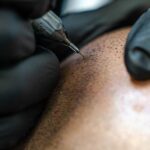A significant drop in collagen production resulting in a breakdown of the underlying structure of skin can make you look a lot older than you actually are. Collagen degradation makes your skin lose firmness and elasticity, which leads to wrinkles and sagging skin. Environmental threats such as pollution and UV exposure could further lead to the discoloration of the skin. Fractional CO2 laser treatments are like dermabrasions and chemical peels, but with the use of minimal heat damage.
What is Fractional CO2 Laser Resurfacing?
The Fractional CO2 laser treatment utilizes lasers to break down damaged skin cells, causing the new and more healthy cells to have the older ones replaced. This skin resurfacing method has been utilized to address scars, wrinkles, warts, nose enlarged oil glands and other skin problems. Fractional CO2 laser resurfacing treatment could help remove pigmentation irregularities and significantly lessen the appearance of wrinkles so the skin appears healthier and younger.
How It Works
The latest version of Fractional CO2 Laser Resurfacing Treatment utilizes continuous light beams or extremely short pulsed light energy transmitted in a scanning pattern to eliminate thin skin layers with little to no heat damage. The procedure utilizes a scattered or pulsed light beam at an extremely high rate so there’s minimal heat damage.
What Does A Fractional Co2 Laser Do?
The Fractional CO2 Laser procedure is a semi-ablative treatment made much more effective by our skin’s healing response. Microscopic laser “wounds” are spaced uniformly throughout the skin being treated. The deeper skin layer is facilitated by the CO2 energy to repair and renew. Fractional lasers get deeper into your skin and could lead to a more effective skin rejuvenation and wrinkle removal. This progressive laser system transmits high precision microbeams of CO2 laser energy into your skin to smoothen wrinkles, fine lines, and scars, eliminate brown spots and other flaws, and tighten your skin.
What Makes Fractional Co2 Laser Treatment Better Than Other Ablative Lasers?
The Fractional CO2 Laser offers all of the advantages of classic ablative resurfacing lasers with no lengthy downtime or high risk of complications. Unlike typical bulk ablation, which heals the skin horizontally, this non-surgical procedure repairs the skin vertically.
What To Expect
If only a small portion of the face is being treated, a local anesthetic can be used to ease the patient’s discomfort. General anesthesia might be utilized if the whole face is being treated. A topical ointment will be administered immediately after the therapy.
It takes at least two weeks for complete healing and recuperation, and there will be slight swelling, redness, and pain. After the procedure, however, these effects will fade in a few days. After the two-week healing period, patients can apply cosmetics to hide the redness, if there’s still any visible redness.
When the redness goes away, the skin should seem tighter and smoother, and wrinkles and skin discoloration should be reduced. Cosmetic doctors highly recommend using a broad-spectrum sunscreen on a regular basis. Moisturizers should be used liberally to sustain the advantages of Fractional CO2 laser treatment.
We also advise smokers to quit smoking prior to therapy and for the first few weeks following treatment to assist the body to recuperate more quickly.
The Benefits of Fractional CO2 Laser Treatments
Other than rendering skin young and wrinkle-free, this excellent therapy has a number of advantages. In fact, Fractional CO2 resurfacing is among the most effective ways of minimizing acne scarring and resurfacing sun-damaged face skin. Due to focused precision therapy, this promotes the body’s natural collagen regeneration process and boosts the healing process. Because the cosmetic doctor could manage the strength of the laser treatment, they can tailor treatments to match individual requirements, desired recovery times, and individual results.









